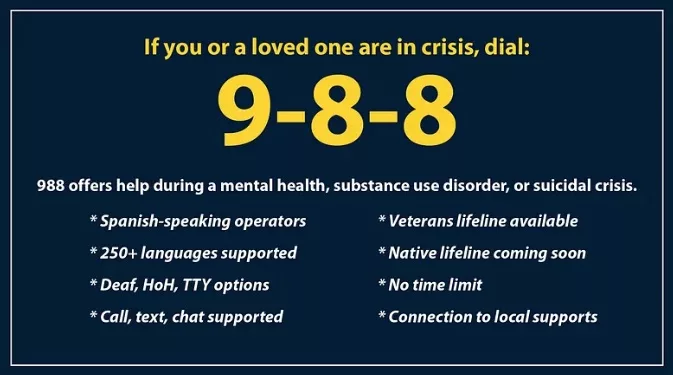
LEWISTON, ID – In its first year, the 988 National Suicide and Crisis Lifeline answered nearly 5 million calls, texts, and chats, including 12,657 in Idaho and more than 65,000 in Washington State, which was the first state to pass legislation to implement the 988 Lifeline. Washington is among only a few states using 988 as more than just a crisis hotline. The 2021 bill also established dedicated funding to create a system that will allow designated 988 contact hubs to dispatch crisis units or directly connect callers to local providers, even helping to schedule appointments.
Washington passed additional legislation in 2023 that expands mobile crisis response capacity, creates regional crisis workforce and training collaboratives, increases collaboration between 911 and 988, and improves how the state reaches those most at-risk. The state also formed the 988 State Affinity Workgroup which allows states and territories to collaborate, share risks and barriers, give advice, and support each other in the nationwide implementation of the 988 system.
“A healthy and humane behavioral health system has three main components: someone to talk to, someone to respond, and someplace to go. Washington state has already demonstrated leadership nationally in reforming a broken system,” according to Michelle McDaniel, Chief Executive Office at Crisis Connections, one of Washington State’s crisis call center locations.
The one-year anniversary of the implementation of the 988 National Suicide and Crisis Lifeline was Sunday. On that day in 2022, the Substance Abuse and Mental Health Services Administration, in partnership with Vibrant Emotional Health, connected the crisis call system in the entire United States.
The 988 code replaced a series of 1-800 numbers used by more than 200 individual call centers across the U.S. Now the same dialing code connects all Americans to crisis call support, 24/7. If one center is busy, another answers.
“This came at a good time for people looking for a resource,” said Nicole Coleman, 988 Program Manager at the Idaho Department of Health and Welfare’s Division of Behavioral Health. “It’s available 24/7, and you’re talking to a live person. Nothing beats being able to speak to a live person when you feel alone.”
This nationwide partnership improved call metrics across the board for call centers across the country.
- The average speed to answer decreased from more than two minutes to only 35 seconds.
- The call drop rate decreased. More calls (45% more) and chats (52% more) were answered.
- Text message answer rates were up 938% because few call centers were able to answer text messages prior to last year.
- Of the nearly 5 million contacts, nearly 1 million were answered by the Veterans Crisis Line.
“I feel confident about what we implemented,” Coleman says. “In the first year, with having a short runway, in the midst of all the changes in our department and the world, the 988 project team, as well as our outside partners, did a good job preparing, implementing, and making 988 available to the people of Idaho.”

